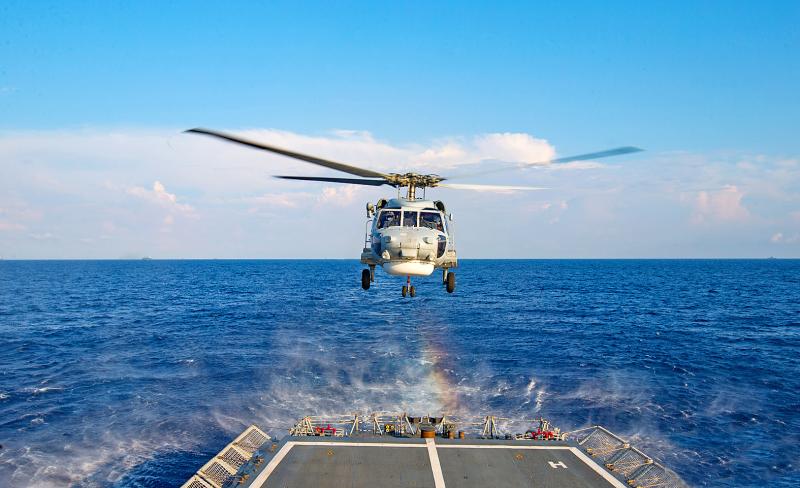Ten Chinese military planes flew into Taiwan’s air defense identification zone yesterday as Taiwan concluded its annual Han Kuang military exercises, the Ministry of National Defense said.
Six J-16 and two J-11 fighters entered airspace between Taiwan and China’s Dongshan Island (東山島), while one Y-8 reconnaissance plane and one Y-8 anti-submarine plane flew to the southeast of Taiwan before turning back, the ministry said in a report.
The air force responded by scrambling planes to monitor the Chinese aircraft, issuing radio warnings and mobilizing air defense assets — the standard practice in responding to intrusions.

Photo provided by the Military News Agency via CNA
Yesterday was the 15th consecutive day of intrusions into Taiwan’s air defense identification zone by Chinese planes, ministry data showed.
The highest number of Chinese aircraft to have entered the zone in a day was 28, which was reported on June 15, while up to 19 planes were recorded on Sept. 5.
The ministry on Sept. 17 last year set up a dedicated section on its Web site for reports of intrusions by Chinese military planes.
The Han Kuang exercises began on Monday by mobilizing fighter jets stationed in the west of Taiwan to fly to the east.
On the last day of the exercises yesterday, the air force tested the counterstrike capabilities of the Indigenous Defense Fighter, while the navy’s Tian Dan, a Cheng Kung-class frigate, was deployed to conduct surveillance and reconnaissance missions alongside other naval vessels.
At the end of the exercises, Minister of National Defense Chiu Kuo-cheng (邱國正) passed on President Tsai Ing-wen’s (蔡英文) encouragement to the armed forces for their hard work this week.
Chiu said the drills were held to test the military’s capability and to demonstrate its commitment to the defense of Taiwan.

A decision to describe a Chinese Ministry of Foreign Affairs statement on Singapore’s Taiwan policy as “erroneous” was made because the city-state has its own “one China policy” and has not followed Beijing’s “one China principle,” Deputy Minister of Foreign Affairs Tien Chung-kwang (田中光) said yesterday. It has been a longstanding practice for the People’s Republic of China (PRC) to speak on other countries’ behalf concerning Taiwan, Tien said. The latest example was a statement issued by the PRC after a meeting between Singaporean Prime Minister Lawrence Wong (黃循財) and Chinese President Xi Jinping (習近平) on the sidelines of the APEC summit

Taiwan’s passport ranked 34th in the world, with access to 141 visa-free destinations, according to the latest update to the Henley Passport Index released today. The index put together by Henley & Partners ranks 199 passports globally based on the number of destinations holders can access without a visa out of 227, and is updated monthly. The 141 visa-free destinations for Taiwanese passport holders are a slight decrease from last year, when holders had access to 145 destinations. Botswana and Columbia are among the countries that have recently ended visa-free status for Taiwanese after “bowing to pressure from the Chinese government,” the Ministry

‘SIGN OF DANGER’: Beijing has never directly named Taiwanese leaders before, so China is saying that its actions are aimed at the DPP, a foundation official said National Security Bureau (NSB) Director-General Tsai Ming-yen (蔡明彥) yesterday accused Beijing of spreading propaganda, saying that Chinese President Xi Jinping (習近平) had singled out President William Lai (賴清德) in his meeting with US President Joe Biden when talking about those whose “true nature” seek Taiwanese independence. The Biden-Xi meeting took place on the sidelines of the APEC summit in Peru on Saturday. “If the US cares about maintaining peace across the Taiwan Strait, it is crucial that it sees clearly the true nature of Lai and the ruling Democratic Progressive Party (DPP) in seeking Taiwanese independence, handles the Taiwan question with extra

HEALTHCARE: Following a 2022 Constitutional Court ruling, Taiwanese traveling overseas for six months would no longer be able to suspend their insurance Measures allowing people to suspend National Health Insurance (NHI) services if they plan to leave the country for six months would be abolished starting Dec. 23, NHIA Director-General Shih Chung-liang (石崇良) said yesterday. The decision followed the Constitutional Court’s ruling in 2022 that the regulation was unconstitutional and that it would invalidate the regulation automatically unless the NHIA amended it to conform with the Constitution. The agency would amend the regulations to remove the articles and sections that allow the suspension of NHI services, and also introduce provisional clauses for those who suspended their NHI services before Dec. 23, Shih said. According to